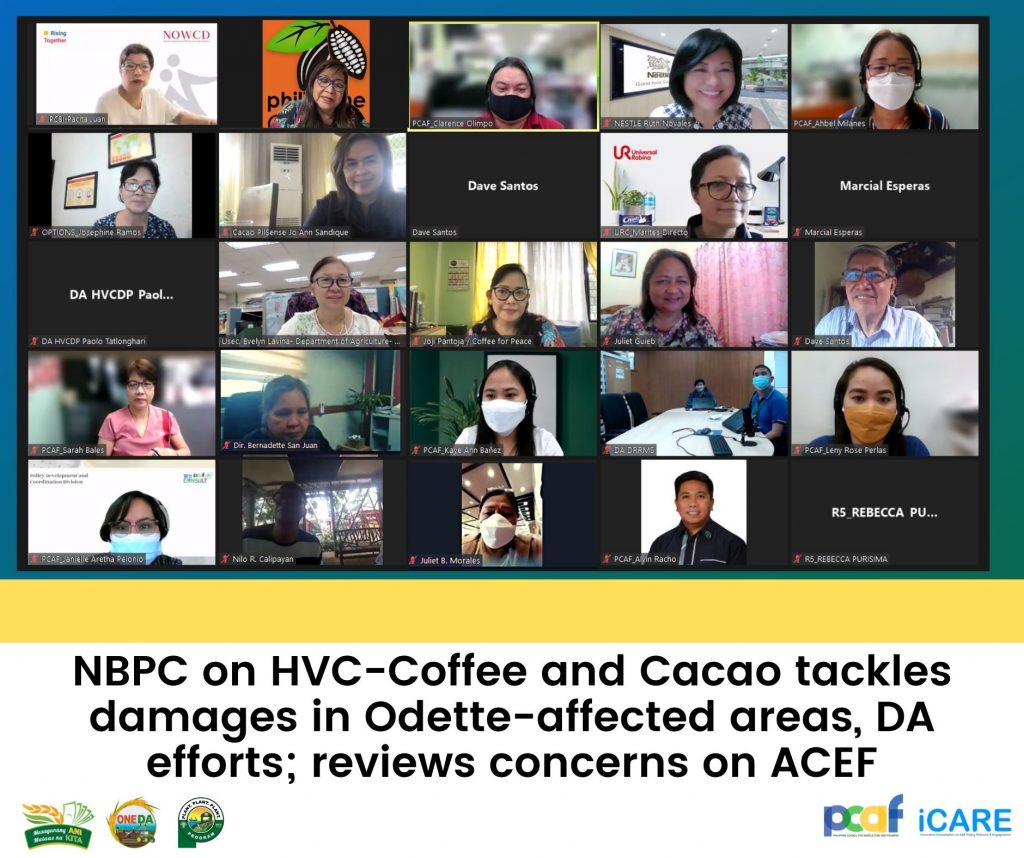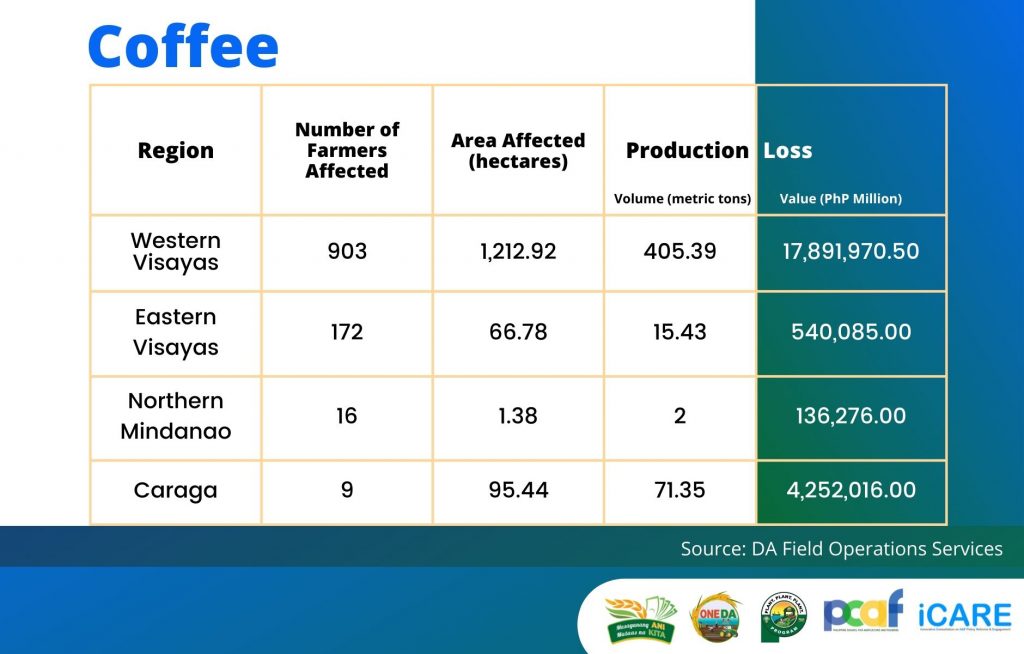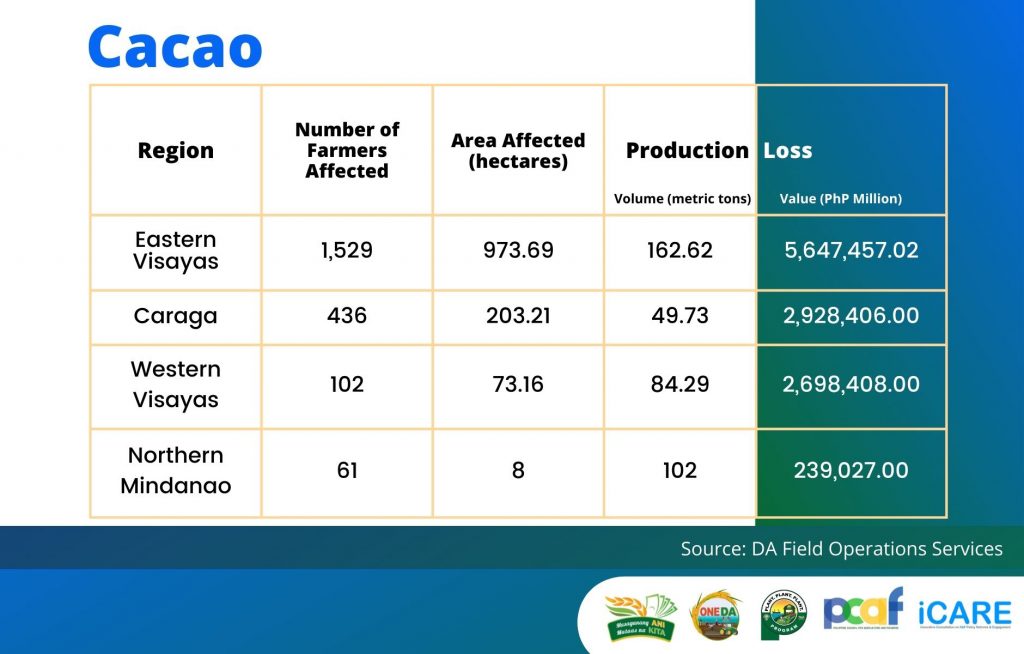
The National Banner Program Committee on High Value Crops- Coffee and Cacao discussed on February 15, 2022 the damage in terms of number of farmers, area affected, and production loss to the coffee and cacao production areas affected by Typhoon Odette.
Department of Agriculture (DA) Field Operations Services OIC Director Bernadette San Juan pointed out the significant rise of damage and losses in the coffee and cacao industry in Western Visayas, Eastern Visayas, Northern Mindanao and Caraga compared to other affected regions.


Aside from the regional data, she also presented DA’s efforts in the provision of cacao and coffee planting materials, fertilizers, and other inputs to the affected farmers of the regions.
In a separate article, DA Secretary William Dar is aware that the efforts provided in every industry were not enough compared to the damages caused by the typhoon, but he said that “this is a good start.”
Aside from the interventions needed by the industry, the Committee also tackled the sufficiency of the supply to address the demand for coffee and cacao, which has worsened by the effects of the typhoon.
DA assured that in the the ongoing National Agriculture and Fisheries Modernization and Industrialization Plan (NAFMIP), a ten-year strategic plan for the agri-fishery sector, it will consider the result of the updated commodity industry roadmaps (CIRs) to ensure that the budget needed for programs identified in the will be provided to ensure sufficiency of supply.
It was emphasized that government and private sector partnership is very important to ensure that the vision, plans, and budget for the development of the coffee and cacao industries, as indicated in the CIRs will be realized even if the administration changed.
To make sure that the plans will be carried out, the Body proposed a recommendation to the House Committee on Food and Agriculture the immediate approval of the proposed bills (House Bill numbers 1271, 3251 and 3598) pushing for the establishment of a National Program for the Coffee Industry.
The Body also raised the concern on budget allocation for data gathering. There is a recommendation to utilize the Municipal Agricultural and Fishery Councils in collecting coffee and cacao data at the local level. The Philippine Council for Agriculture and Fisheries shall consolidate the data and use it as reference in the identification of the current production data and the needed assistance of coffee farmers to increase their production.
Aside from prioritizing data gathering, the Body also suggested capacity-building activities, through the Agricultural Training Institute for farmers in production of organic fertilizers using by-products and other available resources.
It was also noted that instead of distribution of organic fertilizers, farmer organizations should be capacitated instead to produce their own organic fertilizers. Organic fertilizers processing plants should be awarded to certified organic farmers’ organizations in line with this initiative.
Undersecretary for High Value Crops and Rural Credit Evelyn Laviña also added that there is a need to intensify the production of organic fertilizers at the local level.
A resolution to renew ACEF Law
The Committee also agreed on a resolution to renew the Agricultural Competitiveness Enhancement Fund (ACEF) Law or “An Act Further Extending the Period of Implementation of ACEF, Amending for the Purpose Republic Act No. 8178, As Amended by Republic Act No. 9496, Entitled: ‘An Act Replacing Quantitative Import Restrictions on Agricultural Products, Except Rice, with Tariffs, Creating the Agricultural Competitiveness Enhancement Fund, and for other Purposes’” for another four years.
The resolution was passed to continue the provision of assistance to the agri-fishery sector under ACEF. However, there are apprehensions to renew the program because there are only few farmers and fishers, particularly in the coffee and cacao industry, who have applied for assistance under the program.
According to the Committee, there is a need to identify strong justification for the proposal. Once the proposal has been approved, there should be a stronger strategy for information dissemination to ensure that there will be more farmers who can access ACEF.
Although the program provides loans to qualified farmers for start-up business, rehabilitation, or marketing initiatives, there were claims that People’s Organizations were awarded with ACEF Funds even though the organization has unclear plans for action on how to utilize the loan. It was clarified that a clear business plan and utilization of the amount loaned should be included in the submitted proposal and as part of the requirements for application.
The Body also raised that ACEF should streamline its requirements and should be open to possible amendments on its implementing rules and regulations to ensure accessibility to the farmers.
Usec. Laviña explained that the digital application for ACEF assistance has been launched by the Land Bank of the Philippines and DA is not directly involved in it. It was also suggested that the requirements and accredited lending institutions should be disseminated to farmers through the AFCs.
To clear things, a special meeting with LandBank and the DA ACEF Unit will be conducted to clarify issues on application requirements and processing of loans. Aside from the ACEF concern, another agenda that will be discussed at the special meeting will be the DA and Bureau of Customs initiatives for stricter implementation of special safeguard duty (SSG) for coffee. | JC











